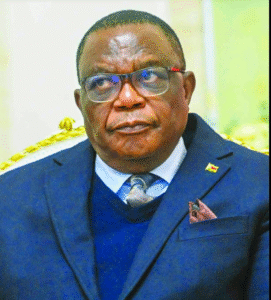FUNERAL BECOMES A RALLYING CRY AS CCC HONOURS MURDERED ACTIVIST PASTOR MASAYA
In a solemn yet defiant show of unity and resistance, Zimbabwe’s main opposition party, the Citizens Coalition for Change (CCC), transformed the funeral of slain political activist Pastor Tapfumaneyi Masaya into a forceful denunciation of the country’s worsening crisis of political violence. The streets of Mabvuku were flooded with mourners, activists, and party supporters, their chants and songs echoing a message that was as much about grief as it was about resistance.
Pastor Masaya’s abduction and murder have become emblematic of a nation haunted by a long, tragic history of political brutality. Snatched by suspected state agents on November 11, Masaya’s tortured and mutilated body was discovered three days later, dumped unceremoniously on the outskirts of Harare. His killing is one of the most chilling reminders yet of the growing climate of fear and repression engulfing Zimbabwe as the December 9 by-elections approach.
For decades, Zimbabwean elections have often been marred by violence, intimidation, and abductions—tactics frequently employed to crush dissent and silence opposition. Masaya’s fate, however, has sparked renewed national outrage, and his funeral became more than just a final farewell. It became a defiant march of solidarity. As CCC leaders led the procession through Mabvuku’s streets, mourners sang liberation songs and denounced the government’s continued failure to protect its citizens.
This was not just mourning—it was protest. It was a loud, public rejection of the normalisation of political terror.
The CCC’s response to Masaya’s death reflects a broader national cry for justice, peace, and reform. The opposition party has long sounded the alarm over the state’s systemic use of violence and coercion, particularly during election seasons. Masaya’s murder, coming so close to the by-elections, has only deepened concerns that Zimbabwe is sliding further away from the rule of law and democratic norms.
His death has also ignited new demands for accountability—not just from the ruling ZANU PF government but from security forces and the judiciary as well, institutions increasingly seen as complicit in enabling political persecution.
Civil society groups and international observers have voiced alarm. Regional and global actors are watching closely, and questions over whether Zimbabwe can deliver credible, free, and fair elections are once again being asked. With political opponents being targeted, arrested, abducted, or killed, the integrity of any upcoming vote is already under severe doubt.
Yet, amid the pain and fear, something powerful stirred in Mabvuku. Pastor Masaya’s funeral became a turning point—a reminder that even in the face of violence, the people’s yearning for justice and democracy remains unbroken. The procession showed Zimbabweans refusing to be silenced, choosing to honour Masaya not just with tears, but with purpose.
The Mnangagwa regime now stands at a fork in the road: either heed the warning signs and move to restore confidence in democratic institutions, or continue down a dark and dangerous path that will only deepen Zimbabwe’s isolation and internal decay.
Pastor Masaya’s legacy cannot be allowed to fade into the statistics of repression. His name now lives among those whose deaths have sparked movements, whose sacrifices become rallying points for resistance.
His murder was intended to strike fear. Instead, it awakened a deeper resolve.
The path to a freer Zimbabwe is far from clear, but if the scenes from Mabvuku are anything to go by, it is a path many Zimbabweans are prepared to walk—together, and unafraid.



